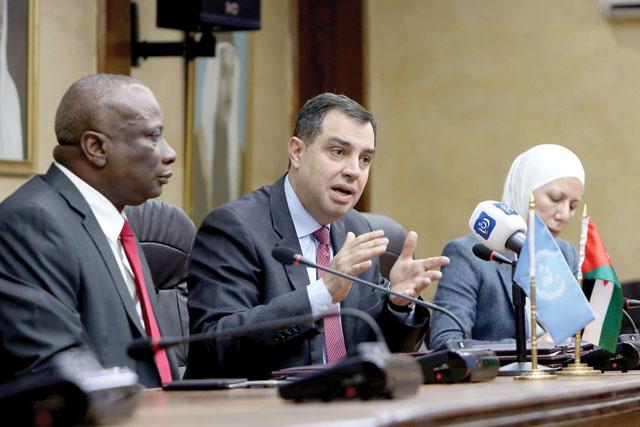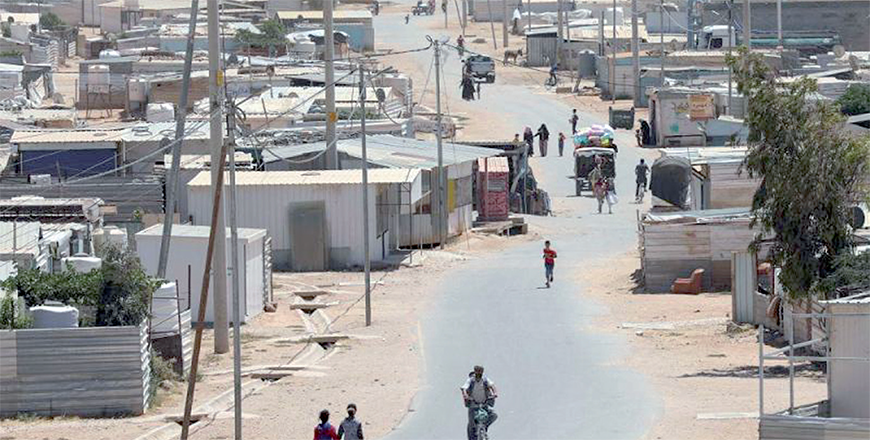You are here
Jordan makes $2.87b appeal under response plan to refugee crisis
By Khetam Malkawi - Dec 04,2014 - Last updated at Dec 04,2014

AMMAN — Jordan on Thursday stressed its commitment to supporting Syrian refugees on its territory, but warned that the same level of support might not be sustained if there is no sufficient funding.
Minister of Planning and International Cooperation Ibrahim Saif said: “We would like to stress Jordan’s commitment to protecting and providing all that it can to our Syrian brothers and guests, and unless a major increase in the support provided by donors is secured, Jordan will not be able to sustain the same level of support for Syrians.”
He added that Jordan alone cannot shoulder the burden required to ease and mitigate the negative impact of the crisis that is stretching Jordanian resources to the limit and “the ability of the country to sustain the development gains that we achieved during the past decades”.
The minister’s remarks came at a meeting with donors and international agencies, where he announced the endorsement of the country’s $2.87 billion Jordan Response Plan (JRP) that seeks to address the repercussions of the Syria crisis on the Kingdom for the year 2015.
The appeal in the response plan covers a programme of targeted interventions to assist both refugees and Jordanian host communities, totalling $889 million and $ 916 million respectively. The plan also appeals for $1.06 billion in direct budget support to compensate the government for a range of other budgetary costs and revenue losses incurred as a direct result of the crisis, including additional subsidies for Syrian refugees, increased security costs and accelerated infrastructure depreciation.
The 2015 response plan seeks to consolidate all major national and international efforts to address the impacts of the Syria crisis on Jordan and is the first nationally led effort of its kind that helps to implement sustainable service delivery systems to better and more effectively meet the needs of both refugees and the Jordanian communities hosting them, according to the minister.
“This is a comprehensive and thorough plan based on a detailed need assessment review and prioritising projects and interventions defined by consensus of all stakeholders,” the minister said.
Addressing donors and international agencies, Saif added that the plan is open for all actors and the government will not describe which stakeholder will undertake any particular activity.
“Once funding is secured, it is left to donors to determine and decide which agency is going to implement a given project,” he explained.
Speaking at the event, the United Nations Resident and Humanitarian Coordinator in Jordan Edward Kallon stressed UN commitment to supporting Jordan in implementing the JRP.
“In 2015 we will… commence on a new chapter where support to refugee and host communities will work under one nationally led plan,” Kallon said.
However, UN agencies themselves are short of fund and the United Nations World Food Programme this week announced the suspension of its direct food assistance programme. The suspension will affect 1.7 million Syrian refugees in the region with 440,000 of them in Jordan.
Jordan is currently host to more than 1.4 million Syrian nationals, of whom 646,700 are registered refugees, while 750,000 were living in the country before the crisis, which broke out in March 2011. Approximately 85 per cent of Syrians have settled outside camps, mainly in Amman, Mafraq, Irbid and Zarqa.
According to the Planning Ministry, the JRP reconciles programming objectives, funding mechanisms and operating systems that often run parallel to each other in addressing short-term people-centred needs and medium- to long-term institutional considerations.
It adopts a resilience-oriented programming approach to first ensure that shocks and stresses do not lead to a long-term deterioration in well-being of a particular individual, household, system or institution; and second, to build capacity to absorb future shocks and deal appropriately with related stresses.
The plan covers 11sectors: education, energy, environment, health, justice, livelihoods and food security, local governance and municipal services, shelter, social protection, transport, and water, sanitation and hygiene.
The JRP 2015 was developed under the overall supervision of the committee overseeing the response plan, led by the Planning Ministry. The panel brings together government representatives, donors and UN agencies to ensure an effective and coherent response to the multifaceted challenges faced by the country as a result of the Syrian crisis.
Related Articles
AMMAN — Planning and International Cooperation Minister Imad Fakhoury on Monday stressed the importance of following a joint approach in reg
The Planning and International Cooperation Ministry and the UN on Saturday signed a launching agreement of the Jordan Resilience Fund (JRF) as a unified channel for donor contributions against the impact of the Syrian crisis on Jordan.
AMMAN — The Jordan Response Plan for the Syria Crisis (JRP) deficit amounted to about $1.612 billion in 2023, according to the JRP e-platfor


















